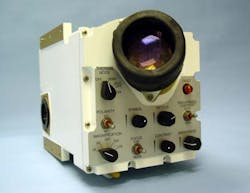Army chooses electro-optical system from Palomar for night vision gun aiming on M1 Abrams main battle tank
ABERDEEN PROVING GROUND, Md. – U.S. Army land warfare experts needed thermal sight displays for the M1 Abrams main battle tank to enable the crew to aim the tank's 120-millimeter primary gun -- especially at night. They found their solution from Palomar Display Products Inc. in Carlsbad, Calif.
Officials of the Army Contracting Command at Aberdeen Proving Ground, Md., announced an $89.2 million seven-year contract to Palomar on Friday to provide the company's binocular image control units (BICUs), as well as spare parts and repairs.
Palomar will provide the Army with the horizontal technology integration second-generation forward-looking infrared BICU, which is the gunner's primary thermal sight on the Abrams tank.
The BICU connects to the second-generation forward-looking infrared thermal receiver unit, which houses a special kit to create the night vision capability for the gunner's site in Abrams tanks.
These kits comprise infrared camera components that are integrated on several different kinds of Army armored combat vehicles to provide thermal imaging capability.
The BICU is the display that enables the tank gunner to acquire targets, maintain situation awareness of the tank's surroundings, and aim the tank main gun.
The Palomar BICU has a dual display that produces large, bright, high-quality images. It is a small system that produces a large field of view,provides high optical magnification, and is reliable in military vehicles.
Related: Panoramic thermal-imaging driving system for military vehicles introduced by Senso Optics
The electro-optical BICU has input power of plus-or-minus 15 volts, plus five volts, and plus 70 volts DC; dissipates 45 Watts; produces S170, RS170A, NTSC, and CCIR raster images; offers normal brightness of 80 to 100 Foot-Lamberts, and brightness as high 500 Foot-Lamberts.
Its binocular field of view is 22.3 degrees with normal eye relief, and 40.8 degrees with no eye relief. It has built-in test, weighs 28 pounds, and meets military standards.
On this contract Palomar will do the work in locations determined with each order, and should be finished by May 2027. For more information contact Palomar Display Products online at www.palomardisplays.com, or the Army Contracting Command at Aberdeen Proving Ground at https://acc.army.mil/contractingcenters/acc-apg.

John Keller | Editor-in-Chief
John Keller is the Editor-in-Chief, Military & Aerospace Electronics Magazine--provides extensive coverage and analysis of enabling electronics and optoelectronic technologies in military, space and commercial aviation applications. John has been a member of the Military & Aerospace Electronics staff since 1989 and chief editor since 1995.

